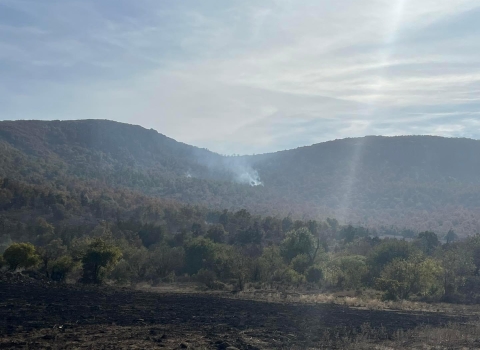The U.S. Fish and Wildlife Service is proposing to designate critical habitat for the endangered Barrens topminnow, a small, colorful fish native to the Cumberland Plateau in middle Tennessee. The species was listed as endangered in November 2019, due to predation from the western mosquitofish. Proposed critical habitat for the Barrens topminnow consists of 1.5 acres of spring pool and 11.4 miles of spring run in Cannon, Coffee, Dekalb, Franklin, Grundy, and Warren Counties, Tennessee.
“The Barrens topminnow is a unique species, and it is our responsibility to help it thrive in its natural habitat,” said Warren Stiles, lead recovery biologist. “Proposing critical habitat for this small fish will help ensure that it survives for future generations and that our local waters are clean and healthy, benefitting residents and wildlife, alike.”
When a species is listed under the Endangered Species Act, the Service is required, where possible, to identify areas essential to the conservation of that species, known as critical habitat. Critical habitat designation requires federal agencies to ensure that actions they plan to undertake, fund, or authorize do not destroy or adversely modify that habitat. It does not establish a wildlife refuge, allow the government or public to access private lands or require non-federal landowners to restore habitat or recover species.
For more details on the proposed critical habitat, please visit our Frequently Asked Questions.
Any final action resulting from this proposed rule will be based on the best scientific data and information available. Therefore, we request comments or information from other concerned governmental agencies, Native American Tribes, the scientific community, industry, or any other interested parties concerning this proposed rule.
For directions on how to submit comments, visit the Federal eRulemaking Portal at http://www.regulations.gov. In the Search box, enter FWS-R4-ES-2023-0224, which is the docket number for this rulemaking. Comments must be received by September 9, 2024. We must receive requests for a public hearing, in writing, at the address shown below by August 23, 2024.
FOR FURTHER INFORMATION CONTACT: Daniel Elbert, Field Supervisor, U.S. Fish and Wildlife Service, Tennessee Ecological Services Field Office, 446 Neal Street, Cookeville, TN 38501; telephone 931-254-9617. Individuals in the United States who are deaf, deafblind, hard of hearing, or have a speech disability may dial 711 (TTY, TDD, or TeleBraille) to access telecommunications relay services. Individuals outside the United States should use the relay services offered within their country to make international calls to the point-of-contact in the United States.
The mission of the U.S. Fish and Wildlife Service is working with others to conserve, protect, and enhance fish, wildlife, plants, and their habitats for the continuing benefit of the American people. For more information on our work and the people who make it happen, visit https://www.fws.gov/program/southeast-region. Connect with us on social media: Facebook, X (formerly known as Twitter), Flickr, and YouTube.
-FWS-



